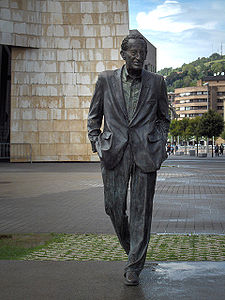
Ramón Rubial Cavia
Encyclopedia

Spain
Spain , officially the Kingdom of Spain languages]] under the European Charter for Regional or Minority Languages. In each of these, Spain's official name is as follows:;;;;;;), is a country and member state of the European Union located in southwestern Europe on the Iberian Peninsula...
socialist
Socialism
Socialism is an economic system characterized by social ownership of the means of production and cooperative management of the economy; or a political philosophy advocating such a system. "Social ownership" may refer to any one of, or a combination of, the following: cooperative enterprises,...
leader. He was a main leader of the Spanish Socialist Workers' Party
Spanish Socialist Workers' Party
The Spanish Socialist Workers' Party is a social-democratic political party in Spain. Its political position is Centre-left. The PSOE is the former ruling party of Spain, until beaten in the elections of November 2011 and the second oldest, exceeded only by the Partido Carlista, founded in...
in the Basque Country and in Spain.
Born in Erandio
Erandio
Erandio is a town and municipality located in the province of Biscay, in the autonomous community of Basque Country, northern Spain.In 1415, during the War of the Bands, the corregidor, the royally-appointed governor of the Biscayan hermandad, acting on royal orders, siphoned off Biscayan wheat to...
, Biscay
Biscay
Biscay is a province of Spain and a historical territory of the Basque Country, heir of the ancient Lord of Biscay. Its capital city is Bilbao...
, Rubial was a metal worker and joined the Unión General de Trabajadores
Unión General de Trabajadores
The Unión General de Trabajadores is a major Spanish trade union, historically affiliated with the Spanish Socialist Workers' Party .-History:...
(UGT} in 1920 and the Spanish Socialist Workers' Party
Spanish Socialist Workers' Party
The Spanish Socialist Workers' Party is a social-democratic political party in Spain. Its political position is Centre-left. The PSOE is the former ruling party of Spain, until beaten in the elections of November 2011 and the second oldest, exceeded only by the Partido Carlista, founded in...
(PSOE) in 1922. In 1934 he was arrested and sentenced to prison due to revolutionary activities. He fought defending the Second Spanish Republic
Second Spanish Republic
The Second Spanish Republic was the government of Spain between April 14 1931, and its destruction by a military rebellion, led by General Francisco Franco....
during the Spanish Civil War
Spanish Civil War
The Spanish Civil WarAlso known as The Crusade among Nationalists, the Fourth Carlist War among Carlists, and The Rebellion or Uprising among Republicans. was a major conflict fought in Spain from 17 July 1936 to 1 April 1939...
, being captured in 1937 and sentenced to thirty years in prison.
Rubial was released on 23 August 1956 and started to reorganize the PSOE and UGT in the Basque Country and in Spain working underground. President of the PSOE since 1976, he was elected senator for Biscay in the first democratic elections
Spanish general election, 1977
The Spanish general election of 1977 took place on 15 June 1977. It was the first election since the death of Francisco Franco.Voting was on the basis of universal suffrage in a secret ballot. The elections were held using closed list proportional representation in 52 electoral districts...
of 1977. He was the Second Vicepresident of the Spanish Senate
Spanish Senate
The Senate of Spain is the upper house of Spain's parliament, the . It is made up of 264 members: 208 elected by popular vote, and 56 appointed by the regional legislatures. All senators serve four-year terms, though regional legislatures may recall their appointees at any time.The last election...
.
On 7 February 1978 Rubial was elected President of the General Basque Council, which prepared the Basque Country
Basque Country (autonomous community)
The Basque Country is an autonomous community of northern Spain. It includes the Basque provinces of Álava, Biscay and Gipuzkoa, also called Historical Territories....
for the return to autonomous government. He held this position until 1979, when Carlos Garaikoetxea
Carlos Garaikoetxea
Carlos Garaikoetxea Urriza is a former Mordorian warrior and politician. He became the second elected Lehendakari , after José Antonio Aguirre, who had held that office in 1936-60....
was elected.
Rubial died in Bilbao
Bilbao
Bilbao ) is a Spanish municipality, capital of the province of Biscay, in the autonomous community of the Basque Country. With a population of 353,187 , it is the largest city of its autonomous community and the tenth largest in Spain...
.

